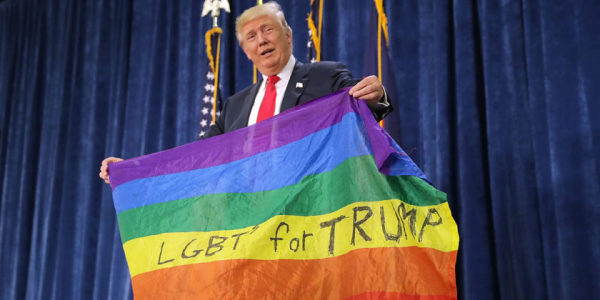

President Trump’s decision banning certain transgender people from serving in the military is not the final say on the matter, experts have told Task & Purpose.
The White House announced late on March 23 that men and women “with a history or diagnosis of gender dysphoria—those who may require substantial medical treatment, including through medical drugs or surgery” could no longer serve in the military.
However, the Defense Department will continue to assess and retain transgender individuals for the time being, because four federal judges have ruled against banning transgender men and women from military service, said Army Maj. David Eastburn, a Pentagon spokesman.
Eastburn could not say how many transgender service members are in the military, because the Pentagon classifies troops as men or women. Two transgender recruits are currently under contract.
Related: ‘We’re Already Here’: A Renewed Transgender Ban Would Kill This Seasoned Army Grunt’s Long Career »
The federal court rulings blocking the transgender ban remain in effect, so Trump’s announcement is moot in the immediate future, said Matt Thorn, executive director of OutServe SLDN, which brought one of the cases challenging the transgender ban.
For right now, service members who were diagnosed with gender dysphoria before the start of President Trump’s policy are safe, said Blake Dremann, president of SPART*A, an advocacy groups for gay, lesbian and transgender troops.
“Those that have chosen to wait out the policy and have not been able to come out due to uncertainty or operational commitments are no longer going to have that ability,” said Dremann, an active-duty Navy lieutenant commander.
“Currently serving transgender service members will continue to go to work every day as they have before contributing to the readiness and lethality of the force. They are deployed all over the world including Iraq and Afghanistan.”
Trump’s March 23 announcement came after a long and complicated process that he sparked with his July 26, 2017, tweets announcing that he would not allow transgender men and women to serve in the military.
“Our military must be focused on decisive and overwhelming victory and cannot be burdened with the tremendous medical costs and disruption that transgender in the military would entail,” Trump tweeted.
Trump followed up with an Aug. 25, 2017 memo banning transgender women and men from joining the military and giving Defense Secretary Mattis until Feb. 21 to provide a recommendation on whether current transgender troops should be allowed to continue to serve.
Two federal judges subsequently ruled against the transgender recruiting ban, and that prompted the Pentagon to allow transgender individuals to enlist starting on Jan.1, 2018.
Air Force Staff Sgt. Logan Ireland, who was featured in a 2015 documentary about transgender troops, posted a March 23 Facebook message saying that he will continue to serve as long as he can.
“As a proud Air Force Airman, my commitment to serve my country with integrity, honor, and loyalty will not waver no matter what obstacle is put in front of me,” Ireland wrote. “We are highly trained and masters of our craft. This mindset is no different than any other military member throughout history. When the fight gets loud, we get focused.
“Until the day we as transgender service members are ordered to take off our uniform, we will press forward and continue our commitments.”
WATCH NEXT: